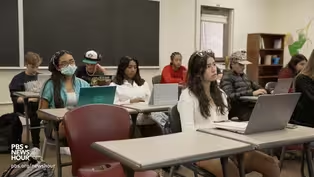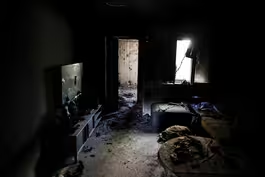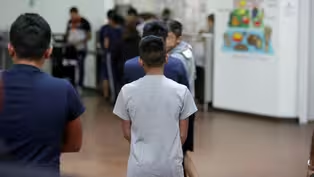
Hundreds killed in strike on Gaza hospital as war worsens
Clip: 10/17/2023 | 13m 36sVideo has Closed Captions
Hundreds killed in strike on Gaza hospital as Israeli-Hamas war worsens
A strike in Gaza hit a hospital Tuesday, killing hundreds. Palestinians and others say it was an Israeli bombing while the Israel Defense Forces say it was an errant missile fired by the militant group Islamic Jihad. The chaos comes ahead of President Biden's scheduled visit to Israel and amid evacuations from Israeli towns and cities along the border with Gaza. Leila Molana-Allen reports.
Problems playing video? | Closed Captioning Feedback
Problems playing video? | Closed Captioning Feedback
Major corporate funding for the PBS News Hour is provided by BDO, BNSF, Consumer Cellular, American Cruise Lines, and Raymond James. Funding for the PBS NewsHour Weekend is provided by...

Hundreds killed in strike on Gaza hospital as war worsens
Clip: 10/17/2023 | 13m 36sVideo has Closed Captions
A strike in Gaza hit a hospital Tuesday, killing hundreds. Palestinians and others say it was an Israeli bombing while the Israel Defense Forces say it was an errant missile fired by the militant group Islamic Jihad. The chaos comes ahead of President Biden's scheduled visit to Israel and amid evacuations from Israeli towns and cities along the border with Gaza. Leila Molana-Allen reports.
Problems playing video? | Closed Captioning Feedback
How to Watch PBS News Hour
PBS News Hour is available to stream on pbs.org and the free PBS App, available on iPhone, Apple TV, Android TV, Android smartphones, Amazon Fire TV, Amazon Fire Tablet, Roku, Samsung Smart TV, and Vizio.
Providing Support for PBS.org
Learn Moreabout PBS online sponsorshipGEOFF BENNETT: Welcome to the "NewsHour."
It's a horrific night in Gaza, where an airstrike hit a hospital, killing hundreds.
Who hit the hospital is in dispute.
AMNA NAWAZ: Palestinians and others said it was an Israeli bombing.
The Israel Defense Forces say it was an errant missile fired by the militant group Islamic Jihad in Gaza.
GEOFF BENNETT: The fallout has been swift.
Condemnations of Israel have poured in from Turkey, Jordan, many Gulf countries and beyond.
And a scheduled meeting among President Biden, Jordanian, Egyptian and Palestinian leaders in Jordan has been canceled.
But President Biden still left this afternoon for a visit to Israel tomorrow.
AMNA NAWAZ: From Israel now, Leila Molana-Allen again begins our coverage.
LEILA MOLANA-ALLEN: In the dark of the night, chaos.
Paramedics carry the dead after an explosion at the Al Ahli Hospital in Gaza City, packed with thousands of wounded Gazans seeking refuge, their sanctuary engulfed in flames.
Gaza's Health Ministry said there were hundreds killed and wounded.
DR. FADEL NAIM, The Islamic University of Gaza: Around 7:00 in the evening, we were still working in the hospital in the O.R.
And, suddenly, we hear a very big, huge explosion.
The false ceiling fall on our heads.
And they came in the O.R., said there's an explosion in the hospital.
LEILA MOLANA-ALLEN: Dr. Fadel Naim was in the hospital's operating room at the time of the massacre.
We spoke to him by phone.
DR. FADEL NAIM: As I went outside, I saw a massacre, everywhere, dead bodies, and people were cut in pieces.
They are people who are looking for safety and came to the hospital because it's a safe place.
It's a massacre.
It's a big massacre.
All people are afraid from being bombed again, and have many little girls with the nurses and our technicians.
They are afraid.
They are crying.
LEILA MOLANA-ALLEN: After the explosion, protests erupted in the Middle East.
And in the West Bank, Palestinians flooded the streets, calling for Palestinian Authority President Mahmoud Abbas to be ousted and condemning the attack.
The Al Shifa Hospital in Gaza, where the wounded were rushed, is already overwhelmed.
And it had already become a hub for thousands of displaced Palestinians, seeking not just healing, but shelter.
Nariman Jamal Al Kombarji left her house after her street was bombed.
Her daughter has special needs.
NARIMAN JAMAL AL KOMBARJI, Gaza City Resident (through translator): We ran away.
Bombs and rockets are everywhere there.
What is happening is not acceptable.
These are children that we are talking about, children with fear built up in their hearts.
How do these children deserve this?
LEILA MOLANA-ALLEN: Another Israeli airstrike today hit the Bureij refugee camp in central Gaza.
Residents rushed the wounded into ambulances to try and save them.
For the survivors, only wails of sorrow.
But Israel said the strike targeted a Hamas command center and killed Ayman Nofal, so far the most high-profile militants known to have been successfully targeted.
At a press conference with German Chancellor Olaf Scholz today, Prime Minister Netanyahu accused Hamas of committing multilayered war crimes.
BENJAMIN NETANYAHU, Israeli Prime Minister: Not only is it targeting and murdering civilians with unprecedented savagery.
It's hiding behind civilians, their own civilians.
LEILA MOLANA-ALLEN: And as civilians try to evacuate, it seems there's no safe zone for Palestinians amidst Israeli bombardment.
This residential building was also destroyed today in the southern city of Khan Yunis, an area in the evacuation zone.
ATTAF WAHDAN, Displaced From Northern Gaza (through translator): We were told that the south is safer.
They displaced us from our homes, so we came to Khan Yunis, as we have children, and it is safer.
But we found that death follows wherever we go.
LEILA MOLANA-ALLEN: Across the border, as Israel braces for war, authorities are doing what they can to evacuate the towns and cities that lie in range of fire along the border with Gaza.
It's just a few days since we were last here in Sderot, but the difference is clear.
People were afraid then.
They were thinking about leaving.
Now it's a ghost town, the streets deserted, the pavements covered in shattered masonry and roof tiles, because there have been so many rocket strikes on this town over the last few days.
Sderot has now evacuated more than 80 percent of its residents, but, for some, leaving home in the midst of some of the worst such trauma is a step too far.
We met 86-year-old Holocaust survivor Gina last week.
Her daughter, unable to reach her since yesterday and frantic with worry, called us, so we went to check on her.
When we last saw Gina, she was stubborn and furious.
Now, after days of endless rocket attacks and with all her friends and neighbors gone, she's in despair.
GINA HALFON, Sderot, Israel Resident (through translator): Where is my government?
I would hit them back right away.
Don't wait.
All week, we are waiting for entrance to Gaza.
For what?
You have decided, so go in.
Don't build up the tension.
This tension is killing us.
LEILA MOLANA-ALLEN: But no matter the urgent calls from her children every five minutes and the rockets raining down overhead, she will not budge from this front porch, where she's sat for 60 years.
GINA HALFON (through translator): Where would I go at this age?
And I don't care about myself when you see small children being kidnapped.
I told my daughter I will not leave my home, only by death.
LEILA MOLANA-ALLEN: As we leave, Gina sits alone once more, watching and waiting for what's to come.
Others here want to go, but have no idea where.
When Hamas fighters invaded her town just over a week ago, single mother Sima Yekhshekel snatched up her three young kids and ran for her life.
She's been putting herself up in a hotel just outside Tel Aviv since then, but can't afford it anymore.
She returned home on Saturday to a fridge full of rotting food, no electricity, and a home in chaos.
SIMA YEKHSHEKEL, Sderot, Israel Resident (through translator): No one in Sderot helped me.
They give money for Sderot.
It's not come to me.
They give me this.
Who cares?
I don't need this.
Look, they send me this.
I don't need this.
Come see what happened.
LEILA MOLANA-ALLEN: While she was away, her neighbor's house was hit by a rocket, sending huge shards of shrapnel ripping through her doors and ceiling.
Sima has been offered refuge in an evacuation hotel in the mixed neighborhood of East Jerusalem, but says that's not an option for her.
SIMA YEKHSHEKEL: They say only Jerusalem.
There are a lot of Arabs with me.
I'm alone with three children.
It's very difficult for me.
LEILA MOLANA-ALLEN: So what are you going to do?
SIMA YEKHSHEKEL: Stay here.
Maybe I will live.
Maybe I will die.
LEILA MOLANA-ALLEN: Many across the country, including Israelis who once expounded negotiation and supported the rights of Palestinian civilians, now feel the same: It's us or them.
We have just had a massive alert go off for rockets coming overhead here on the highway as troops assemble for the war.
Just a mile from the border, these war staging areas are in clear sight of Hamas' rockets, as are the civilian towns and villages along the Gaza border.
With hundreds of incoming rockets every day, the death toll would be much higher but for Israel's savior, the Iron Dome system.
The state-of-the-art defense system detects and intercepts incoming rockets in real time, but overwhelmed by an assault on this scale, some slip through the net.
The IDF says the past week marks the most intense missile assault from Gaza.
They have seen.
In the 2014 Gaza war, Hamas launched 5,000 rockets in 50 days.
This time, they have already launched 6,000 in just over a week.
MAJ. LIBBY WEISS, Israeli Defense Forces: And so we're seeing many, many more rockets and far more advanced rockets that Hamas is launching to Israeli communities.
LEILA MOLANA-ALLEN: Civilians on both sides of the border here are praying for peace, but preparing themselves for an even bloodier war.
For the "PBS NewsHour," Leila Molana-Allen on the Israel-Gaza border.
MNA NAWAZ: For more on the day's fast-changing developments, I'm joined now by my colleagues foreign affairs and defense correspondent Nick Schifrin and White House correspondent Laura Barron-Lopez.
Nick, let's begin with that news of the day of this horrific strike on the hospital in Gaza.
The Israeli Defense Forces say, it wasn't them; it was an air into Islamic Jihad strike, but many people still believe it was the Israelis.
What do we know at this point?
NICK SCHIFRIN: Well, it is competing claims right now, as you say, Amna.
The Israeli Defense Forces say it was not them.
They have said that pretty quickly right after the strike.
And I think even in the last 10 or 15 minutes, I have got that statement again from IDF officials about four or five times.
What they just said a few minutes ago was that they have gone back, they have done an analysis of what they called their operational system, and they blame rockets fired by what they call terrorists in Gaza that passed by the hospital at the time it was hit.
They say it was from multiple sources of intelligence, indicates Islamic Jihad, as you said at the top, was responsible for what they called a failed rocket launch that hit the hospital.
Again, that is what the Israeli Defense Forces are saying.
The Palestinians are saying it was an Israeli airstrike.
In the past, just some context here in Gaza, Israel has hit hospitals in this war and in the past.
And we have also have seen Palestinian groups fire rockets that misfire that land in Gaza.
So, the competing claims will continue.
AMNA NAWAZ: Laura, what have we heard from the White House about this?
Have they been able to weigh in or see any evidence about who was behind this attack?
LAURA BARRON-LOPEZ: When it comes to the evidence, Amna, they aren't saying who they believe was responsible for the strike, but the - - a White House official did issue a statement just a moments ago, saying that the president sent his deepest condolences for the innocent lives lost in the hospital explosion in Gaza and wished a speedy recovery to the wounded, and that ultimately the president is not going to be making the Jordan portion of his trip.
After consulting with King Abdullah of Jordan and also due to the mourning, the day of mourning announced by President Abbas of the Palestinian Authority, President Biden considered it best that he not do that second portion of his trip and agreed to remain in close contact with the leaders and hopes to be speaking to them in the coming days.
But that takes a big portion out of his desired stops for this trip, Amna.
AMNA NAWAZ: Nick, one of the reasons President Biden wanted to make that trip to Jordan was to try to contain this from becoming a regional larger conflict.
NICK SCHIFRIN: Yes.
AMNA NAWAZ: What are the implications of that summit not happening now?
NICK SCHIFRIN: It is the implications for the summit not happening, the implications of this strike.
The images have been fast-forwarding through the entire region and through the world, and it will make that containing of this war so much more difficult.
Let's just go through and think about the summit.
What President Biden needs is help from one of the summit's participants, Abdel Fattah El-Sisi, the president of Egypt.
He is now not going to be able to talk to him.
And they need Egypt to open the Rafah Crossing into Gaza in order to allow humanitarian aid and American citizens leave from Gaza.
Laura just mentioned the Palestinian Authority president, Mahmoud Abbas, not being willing or not able to meet the president, President Biden, in Amman, again, someone that the president needs to try and keep a lid on violence, especially into the West Bank and Jerusalem, and, of course, King Abdullah of Jordan.
Jordan oversees the holiest sites in Jerusalem, a key, key figure that has been close to the United States for so many years.
And if this war is going to be contained, all three of those figures are going to need to participate with the United States in what it's trying to do to try and prevent Lebanese Hezbollah, to try and prevent Iran from entering this war.
But if we see this day of rage across the region, if these leaders are not willing to even be seen in public with the president, containing this war becomes much more difficult.
AMNA NAWAZ: Laura, we should stress we still don't know a lot, especially in the fog of war.
There are these disputing claims about this horrific hospital strike tonight.
But what does this mean for the relationship between the U.S. and Israel?
President Biden has pledged that the U.S. will stand with Israel.
Does that change the landscape moving forward?
LAURA BARRON-LOPEZ: I think that, so far, President Biden has been very clear that he plans to continue showing solidarity with Israel, that he is continuing to go on this trip.
He arrived at Joint Base Andrews just moments ago to head to Israel to meet with Israeli Prime Minister Benjamin Netanyahu in person.
And when he has those face-to-face conversations, sources close to the White House tell me that he is still going to try to stress that point that Nick was making, which is that it's very important to the administration's that this is a contained conflict, that it does not escalate, and that also they are really going to try to focus on making sure that civilians in Gaza are out of harm's way as much as possible.
So, of course, the inability to go to Jordan really hurts the president's ability to prioritize that second part of what his mission was on this trip, but it's something that he will be talking to Netanyahu about.
AMNA NAWAZ: That is our White House correspondent, Laura Barron-Lopez.
Laura, thank you.
Admissions essays more important after affirmative action
Video has Closed Captions
Clip: 10/17/2023 | 7m 41s | College admissions essays more important for students after end of affirmative action (7m 41s)
A Brief But Spectacular take on making birth safer
Video has Closed Captions
Clip: 10/17/2023 | 3m 47s | Melinda French Gates' Brief But Spectacular take on making birth safer for moms and babies (3m 47s)
Families of Americans kidnapped by Hamas describe anguish
Video has Closed Captions
Clip: 10/17/2023 | 6m 29s | Families of Americans kidnapped by Hamas describe anguish and what they want Biden to do (6m 29s)
A look at Jim Jordan's often controversial record
Video has Closed Captions
Clip: 10/17/2023 | 11m 11s | A look at Jim Jordan's often controversial record in Congress (11m 11s)
Settlement would stop U.S. from separating migrant families
Video has Closed Captions
Clip: 10/17/2023 | 6m 25s | Settlement would stop U.S. government from separating families at border (6m 25s)
Providing Support for PBS.org
Learn Moreabout PBS online sponsorship
- News and Public Affairs

FRONTLINE is investigative journalism that questions, explains and changes our world.

- News and Public Affairs

Amanpour and Company features conversations with leaders and decision makers.












Support for PBS provided by:
Major corporate funding for the PBS News Hour is provided by BDO, BNSF, Consumer Cellular, American Cruise Lines, and Raymond James. Funding for the PBS NewsHour Weekend is provided by...




